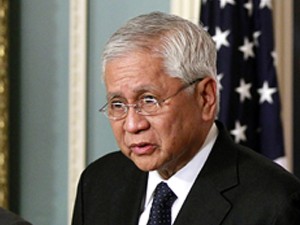DFA chief: More US troops allowed under PH-US defense pact
MANILA, Philippines – Foreign Secretary Albert Del Rosario said Saturday a greater presence of American troops in the country should be welcomed as such was allowed under the long-standing mutual defense treaty between the Philippines and the United States.
The country’s top diplomat, however, stressed that the establishment of any US military facility could be granted only if it would be under the control of the Philippine military and would not violate the Constitution, which bars the US from using military bases in the country.
“Our MDT (Mutual Defense Treaty) calls for joint action if either Philippines or US is attacked. It would then be logical to assume that in the event of an attack on the Philippines or on our treaty ally, the US would be allowed to use our bases,” Del Rosario told the Philippine Daily Inquirer.
“For example, if the US were to propose a facility in the Philippines to support humanitarian assistance, disaster response and maritime security—one that is mutually beneficial, one that is controlled by the AFP (Armed Forces of the Philippines) and one that is not violative of the Philippine Constitution— we should welcome that form of assistance and cooperation,” he added.
Del Rosario made the comment when asked about Defense Secretary Voltaire Gazmin’s statement Friday on the possibility of restoring US bases in the Philippines in case of war on the Korean Peninsula.
Gazmin said Friday that permitting the return of US bases in the Philippines might happen “in cases of extreme emergency,” including the possible breakout of war in the Korean Peninsula.
Amid doubts about its weapons and nuclear launch capabilities, North Korea has threatened to wage war against South Korea and its ally, the United States, following fresh international sanctions for its nuclear tests earlier this year.
The two countries along with Japan, another defense ally, have raised their defense posture in the face of Pyongyang’s persistent war rhetoric.
The Philippines is closely monitoring developments on the Korean Peninsula, mainly to look after the welfare of some 40,000 Filipinos known to be residing there.
The Philippine Embassy in Seoul has been on Alert Level 1 since North Korean leader Kim Jong-Un came out with his nuclear threat two weeks ago.
Under this alert level, embassy officials are in constant contact with the Filipino community in Korea and continue to refine an evacuation plan for Philippine nationals if the tension escalates.
US bases in Clark, Pampanga and Subic Bay, Olongapo City were closed down in 1992 following a Senate vote, ending nearly a century of US military presence in the country.
But defense cooperation between the two countries has been close in the last 20 years since. Most recently, both sides vowed to further deepen such relationship amid common concerns in the region.
In meetings in Washington D.C. earlier this April, Del Rosario reaffirmed such ties with US Secretary of State John Kerry, Defense Secretary Chuck Hagel and Deputy Defense Secretary Ashton Carter.
During the meetings, US officials discussed progress in increasing rotational presence of US troops in the Philippines and the conduct of further joint military exercises in the areas of both defense and humanitarian and disaster response.
The US is keen on the security situation in the Asia Pacific amid its defense pivot to the region.
